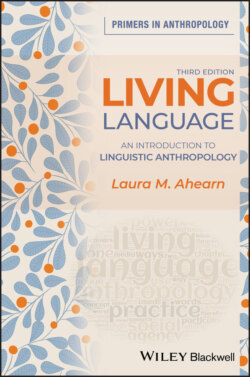Читать книгу Living Language - Laura M. Ahearn - Страница 29
Language Ideologies
ОглавлениеLanguage ideologies10 are the attitudes, opinions, beliefs, or theories that we all have about language. Susan Gal and Judith Irvine consider such ideologies “to be neither true nor false. They are positioned and partial visions of the world” (Gal and Irvine 2019:2). We may or may not be conscious of them, and they may or may not square with scholars’ views about language (which are also, of course, language ideologies). Language ideologies can be about language in general (e.g., “Language is what separates humans from other species”), particular languages (e.g., “French is such a romantic language!” – see Figure 1.5 for a cartoon making fun of this language ideology), particular linguistic structures (e.g., “Spanish is complicated as it has two forms of the verb ‘to be’”), language use (e.g., “Never end a sentence with a preposition”) – or about the people who employ specific languages or usages (e.g., “People who say ‘ain’t’ are ignorant,” or, “People who live in the United States should speak English,” or, “Women are more talkative than men”). Scholars working within this fast-growing, exciting area of language ideology study, for example, how socially and politically influenced attitudes toward an endangered language can affect the likelihood of its survival (e.g., Jaffe 1999; Kulick 1998; Shaul 2014), or how teenagers and adults embrace or reject ways of speaking that link them with various racial, ethnic, or gendered identities (e.g., Briggs 1998; Bucholtz 2001; Cameron 1997; Cavanaugh 2012; Cutler 2003; Gaudio 2001; Kroskrity 2000a ).
In almost all cases, language ideologies turn out to be about much more than just language. As Judith Irvine notes, language ideologies are “the cultural (or subcultural) system of ideas about social and linguistic relationships, together with their loading of moral and political interests” (1989:255). Therefore, language ideology as a concept allows scholars to connect micro- with macro-level social interactions and to analyze questions of cultural identity, morality, power, inequality, and social stereotypes. Paul Kroskrity (2000b:8–23) lists four features that characterize language ideologies.
1 Language ideologies almost always serve the interests of a specific social or cultural group. In other words, in the uneven social terrain that exists in all communities, language ideologies come to express the judgments and stereotypes of particular segments of each community. There are benefits to be had from certain language variants being deemed “standard” while others are labeled “sub-standard dialects” or “slang.” Such labels and judgments are social rather than linguistic in nature, for every single person has an accent, and all dialects are rule-governed.
2 Language ideologies in any given society are best conceived of as multiple because all societies consist of many different divisions and subgroupings. There will, therefore, be many different ideas about language in any single community. Moreover, people can belong to many different social groups simultaneously and may therefore hold multiple (sometimes contradictory) language ideologies.
3 People may be more or less aware of their own or others’ language ideologies. Certain types of ideas about language use or linguistic structures tend to be more accessible to people, while others are less so (Silverstein 1979, 2001). At times, language ideologies become the subject of public debate, as happened during the 1996–1997 Ebonics controversy, and these occurrences can be very illuminating to study. Just as interesting and potentially even more powerfully influential, however, are the language ideologies that people do not realize that they hold.
4 People’s language ideologies mediate between social structures and forms of talk. This bridging of micro-level speech and macro-level social structures is one of the most important contributions a study of language ideologies can make.
In many respects, therefore, attention to language ideologies can help scholars in linguistic and cultural anthropology (and beyond) understand how both language and culture shape and are shaped by human actions. To understand this recursive relationship further, we turn now to the concept of practice.11
